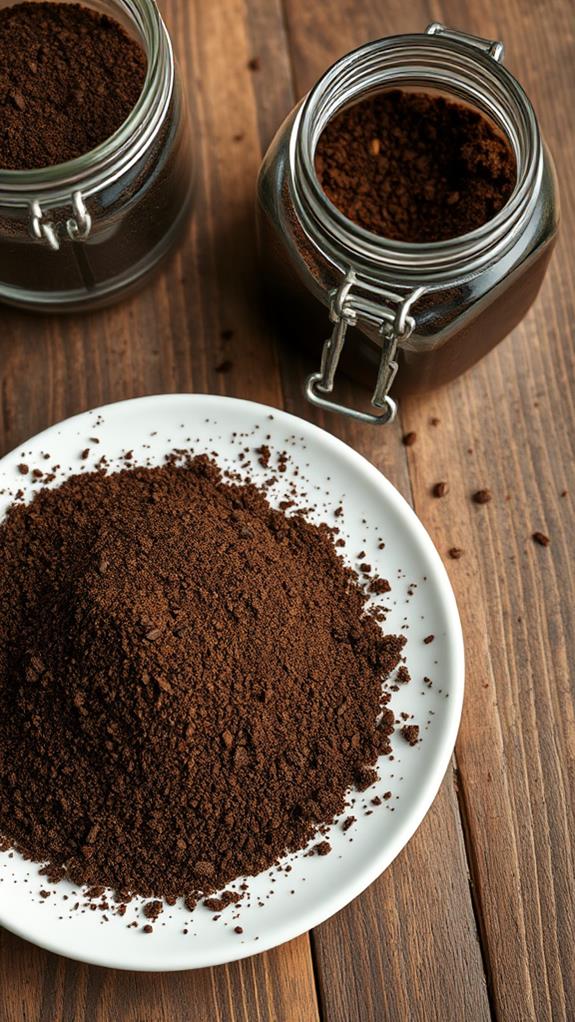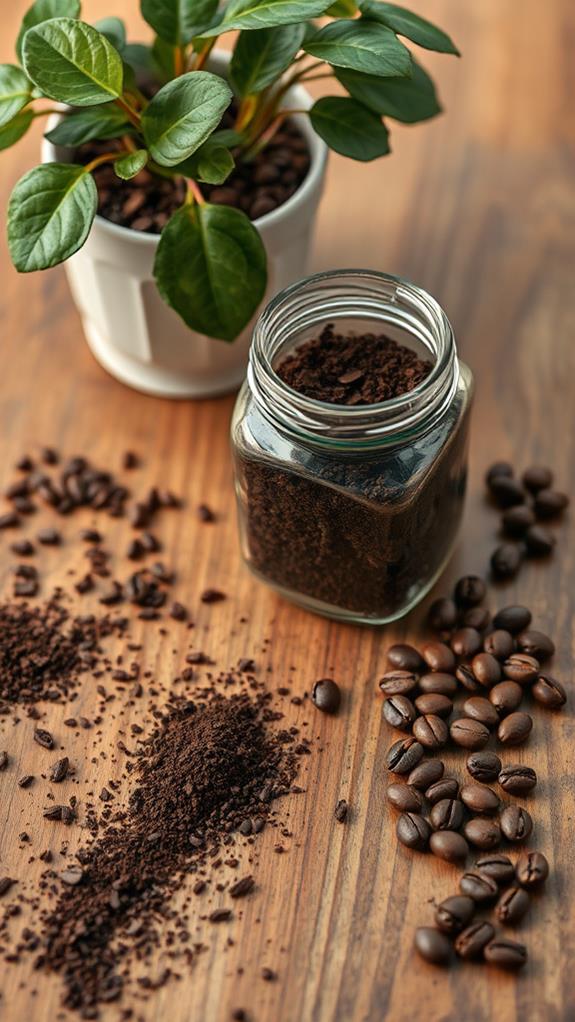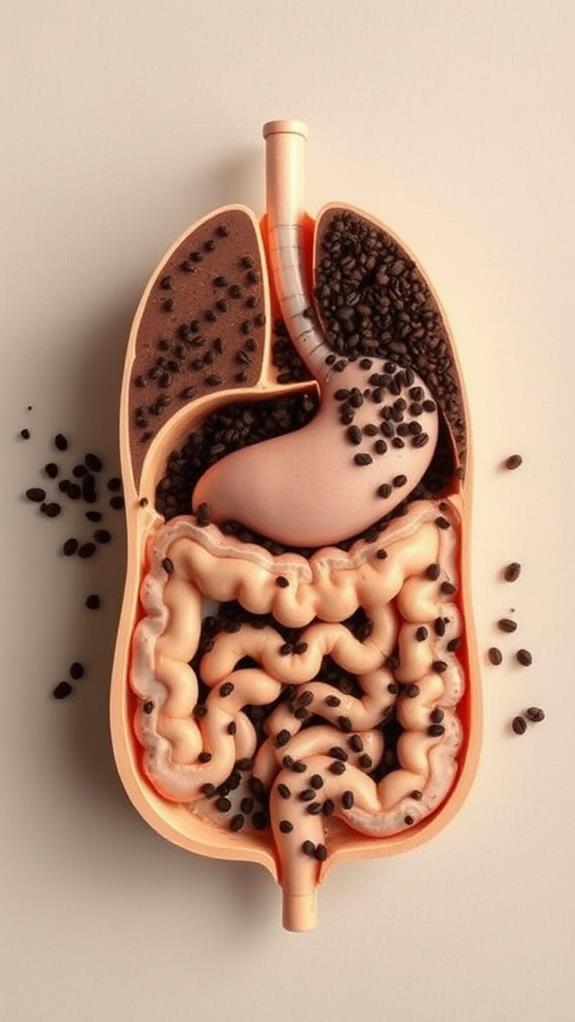Is It Safe to Eat Coffee Grounds
While coffee grounds are generally safe to eat in small amounts, consuming them regularly or in large quantities can pose potential health risks. They contain beneficial compounds like antioxidants and fiber but also have high caffeine content and abrasive textures. You may experience digestive issues, increased anxiety, or sleep disturbances if you consume too much. It's best to incorporate small amounts of finely ground coffee into baked goods or use them as a seasoning rather than eating them directly. Consult a healthcare professional before making significant changes to your diet. Understanding the composition and effects of coffee grounds can help you make informed decisions about their consumption.
This post may contain affiliate links. If you make a purchase through these links, I may earn a commission at no additional cost to you. Additionally, portions of this post may be generated using artificial intelligence (AI) technology. While we strive for accuracy, please be aware that AI-generated content may not always be perfect and should be fact-checked when necessary.
The Spatula Scoops
- Consuming coffee grounds is generally not recommended by health experts due to potential digestive issues and high caffeine content.
- Coffee grounds contain beneficial compounds like antioxidants and fiber but can be abrasive to the stomach lining.
- Small amounts of coffee grounds in baked goods or as seasoning are generally considered safe for most people.
- Overconsumption of coffee grounds may lead to negative side effects like anxiety, jitters, and sleep disturbances.
- Individuals with sensitivities or health conditions should consult a healthcare professional before incorporating coffee grounds into their diet.
Understanding Coffee Grounds

Most coffee drinkers are familiar with coffee grounds, but few understand their composition and properties. Coffee grounds are the residual particles left after brewing coffee. They're composed of cellulose, lignin, and other organic compounds, along with residual oils and caffeine. When you brew coffee, you're extracting soluble substances from these grounds, but much remains behind. These grounds come from green coffee beans, which are unroasted seeds from coffee cherries that undergo various processing methods before roasting.
You'll find that coffee grounds have a gritty texture and a strong, bitter taste. They retain some of the coffee's original flavor profile, but it's intensified due to the concentration of compounds. The grounds also contain antioxidants, which are beneficial substances that can neutralize harmful free radicals in your body.
It's important to note that coffee grounds aren't the same as instant coffee powder. While instant coffee dissolves completely in water, grounds remain solid. This distinction is indispensable when considering consumption. The grounds' insoluble nature means your digestive system processes them differently than liquid coffee. Understanding these characteristics is vital for evaluating the safety and potential benefits of consuming coffee grounds, which we'll explore further in subsequent sections.
Nutritional Value
Nutrition enthusiasts often overlook coffee grounds as a potential source of nutrients. While you might think of them as waste, coffee grounds actually contain several beneficial compounds. They're rich in dietary fiber, which aids digestion and promotes feelings of fullness. You'll also find antioxidants, such as chlorogenic acid, that can help protect your cells from damage. Similar to unsweetened cacao powder, coffee grounds are a versatile ingredient that can be incorporated into various recipes for added nutritional benefits.
Coffee grounds contain small amounts of essential minerals, including:
- Magnesium, important for bone health and energy production
- Potassium, pivotal for heart function and blood pressure regulation
- Phosphorus, necessary for strong bones and teeth
However, it is crucial to recognize that the nutrient content can vary depending on the coffee bean type and roasting process. While coffee grounds do offer some nutritional benefits, they shouldn't be considered a primary source of nutrients in your diet. The caffeine content in coffee grounds is also worth considering, as it can affect your sleep patterns and overall health if consumed in large quantities. If you're interested in incorporating coffee grounds into your diet, it's best to do so in moderation and consult with a healthcare professional, especially if you have any existing health conditions.
Potential Health Benefits

You might be surprised to learn that coffee grounds are considered an antioxidant-rich superfood. These grounds contain powerful compounds that can help fight free radicals in your body, potentially reducing the risk of various diseases. Like organic cacao butter, coffee grounds are versatile and can be incorporated into various recipes for added health benefits. Additionally, some people claim that consuming coffee grounds may aid digestion, though more research is needed to confirm this benefit conclusively.
Antioxidant-Rich Superfood
Coffee grounds have gained attention as a potential antioxidant-rich superfood, packing a punch of health benefits. These grounds contain high levels of polyphenols, which are powerful antioxidants that can help protect your body from harmful free radicals. When you consume coffee grounds, you're ingesting a concentrated source of these beneficial compounds.
The antioxidant content in coffee grounds is particularly remarkable for several reasons:
- Higher concentration: Coffee grounds contain more antioxidants than brewed coffee.
- Diverse compounds: They include chlorogenic acids, caffeic acid, and melanoidins.
- Prolonged effects: The antioxidants in grounds may have a longer-lasting impact on your body.
You'll find that coffee grounds can contribute to your overall antioxidant intake, potentially reducing inflammation and supporting cellular health. However, it is crucial to remember that while coffee grounds are rich in antioxidants, they should be consumed in moderation. Excessive intake may lead to digestive discomfort or interfere with nutrient absorption. As with any dietary change, it is wise to consult with a healthcare professional before incorporating coffee grounds into your regular diet.
Potential Digestive Aid
Beyond their antioxidant properties, coffee grounds may offer potential benefits for your digestive system. When consumed in moderation, they can act as a natural laxative, promoting regular bowel movements and potentially easing constipation. The high fiber content in coffee grounds contributes to this effect, helping to bulk up stool and stimulate peristalsis, the rhythmic contractions that move food through your digestive tract.
Additionally, coffee grounds may support the growth of beneficial gut bacteria, acting as a prebiotic. These microorganisms play a pivotal role in maintaining a healthy digestive system and can influence various aspects of your overall health. The compounds found in coffee grounds, such as chlorogenic acids and melanoidins, may also help reduce inflammation in the gut and protect against certain digestive issues.
However, it is imperative to note that consuming large amounts of coffee grounds can lead to negative side effects, such as increased acidity and potential irritation of the digestive lining. As with any dietary change, it is wise to introduce coffee grounds gradually and in small quantities. If you experience any discomfort or unusual symptoms, consult with a healthcare professional before continuing this practice.
Possible Risks and Side Effects
Consuming coffee grounds may pose some potential risks and side effects that you should be aware of. While coffee grounds can offer certain benefits, ingesting them in large quantities or frequently might lead to adverse effects on your health.
One of the primary concerns is the high caffeine content in coffee grounds. Unlike brewed coffee, where much of the caffeine is extracted into the liquid, eating grounds exposes you to a more concentrated dose. This can result in:
- Increased anxiety and jitters
- Sleep disturbances or insomnia
- Digestive discomfort, including stomach upset and diarrhea
Additionally, coffee grounds contain compounds called tannins, which can interfere with iron absorption in your body. If you're prone to iron deficiency or anemia, consuming coffee grounds might exacerbate this issue.
The abrasive nature of coffee grounds can also potentially damage your tooth enamel over time. This is particularly concerning if you have sensitive teeth or existing dental issues.
Lastly, some people may experience allergic reactions to coffee grounds, manifesting as skin rashes, itching, or difficulty breathing. If you notice any of these symptoms after consuming coffee grounds, discontinue use and consult a healthcare professional immediately.
Safe Consumption Methods

While eating coffee grounds can pose risks, there are safer methods to incorporate them into your diet. You can start by adding small amounts of finely ground coffee to baked goods, such as cookies or brownies. This method allows you to enjoy the flavor and potential benefits without consuming large quantities of grounds directly.
Another approach is to use coffee grounds as a seasoning or rub for meats. You'll get a rich, smoky flavor while limiting your intake. If you're keen on consuming grounds more directly, consider blending them into smoothies or yogurt. This technique helps distribute the grounds evenly, reducing the risk of consuming too much at once.
For those interested in the potential health benefits, you can try brewing coffee grounds multiple times. This process, known as "double brewing," extracts more compounds while making the grounds more palatable. Remember to start with small amounts and gradually increase your intake to gauge your body's response. Always consult with a healthcare professional before making significant changes to your diet, especially if you have pre-existing conditions or sensitivities to caffeine.
Culinary Uses
You can incorporate coffee grounds into various culinary creations, expanding your cooking repertoire. For coffee-infused recipes, try adding a tablespoon of finely ground coffee to chocolate cakes, brownies, or homemade ice cream for a rich, complex flavor. When it comes to savory dishes, coffee grounds make an excellent ingredient in meat rubs, imparting a deep, earthy taste to steaks, ribs, or roasted chicken.
Coffee-Infused Recipes
Coffee grounds offer numerous culinary possibilities beyond brewing your morning cup. You can incorporate them into various recipes to add depth, texture, and a unique coffee flavor to your dishes. For instance, you might use finely ground coffee as a rub for meats, enhancing the savory notes in your barbecue or roast.
When baking, coffee grounds can elevate the richness of chocolate desserts. Try adding a tablespoon of grounds to your brownie or cake batter for an extra layer of complexity. You'll find that the coffee intensifies the chocolate flavor without overpowering it.
For a more adventurous approach, consider these coffee-infused recipes:
- Coffee-crusted steak with espresso-infused sauce
- Mocha smoothie bowl with ground coffee garnish
- Tiramisu ice cream with coffee ground swirls
Meat Rub Ingredient
Many professional chefs and home cooks alike have discovered the secret ingredient for an extraordinary meat rub: coffee grounds. You might be surprised to learn that these leftover grounds can add a rich, complex flavor to your meat dishes. When used as part of a dry rub, coffee grounds impart a subtle bitterness and earthiness that enhances the natural flavors of beef, pork, and even poultry.
To create a coffee-based meat rub, you'll want to combine finely ground coffee with other spices like salt, pepper, paprika, and brown sugar. The coffee's acidity helps tenderize the meat while creating a flavorful crust during cooking. For ideal results, apply the rub generously and let it sit on the meat for at least an hour before grilling or roasting. This allows the flavors to penetrate the meat, resulting in a more robust taste profile.
When incorporating coffee grounds into your meat rub, remember that a little goes a long way. Start with a small amount and adjust to your taste preferences. You'll find that this unique ingredient can elevate your grilling game and impress your dinner guests with its unexpected depth of flavor.
Caffeine Content Considerations

Typically, caffeine content remains a primary concern when considering the consumption of coffee grounds. You'll find that coffee grounds contain a significant amount of caffeine, even after brewing. When you eat them, you're ingesting a concentrated dose of this stimulant. This can lead to various effects on your body, including increased alertness, faster heart rate, and potential jitters or anxiety.
It's important to be aware of your caffeine tolerance and daily intake. The FDA recommends no more than 400mg of caffeine per day for most adults. When consuming coffee grounds, you should consider:
- The type of coffee bean used
- The roast level (darker roasts typically have less caffeine)
- The amount of grounds consumed
Keep in mind that caffeine content can vary widely depending on these factors. For example, a tablespoon of used coffee grounds might contain anywhere from 60 to 110mg of caffeine. If you're sensitive to caffeine or have any health conditions, it's essential to consult with a healthcare professional before incorporating coffee grounds into your diet. They can help you determine a safe amount based on your individual needs and circumstances.
Organic vs. Conventional Grounds
When considering whether to eat coffee grounds, you'll want to weigh the differences between organic and conventional options. Organic coffee grounds may offer health benefits due to their lack of synthetic pesticides and fertilizers, potentially reducing your exposure to harmful chemicals. However, conventional coffee grounds might still retain traces of pesticides, which could be a concern if you're planning to consume them directly.
Health Benefits Comparison
Consumers often wonder if there's a significant difference between organic and conventional coffee grounds when it comes to health benefits. While both types offer similar nutritional profiles, organic coffee grounds may have a slight edge due to their cultivation methods. Organic coffee is grown without synthetic pesticides or fertilizers, potentially reducing your exposure to harmful chemicals.
When comparing health benefits, consider these factors:
- Antioxidant content: Both organic and conventional coffee grounds are rich in antioxidants, but organic may have higher levels due to natural pest resistance.
- Caffeine levels: The caffeine content is generally similar, regardless of cultivation method.
- Mineral content: Organic coffee may contain slightly higher levels of essential minerals due to soil management practices.
It's important to note that the roasting process can impact the nutritional content of both types. Dark roasts typically have lower caffeine and chlorogenic acid levels compared to light roasts. Ultimately, the health benefits you'll derive from consuming coffee grounds depend on various factors, including your overall diet and lifestyle. Whether you choose organic or conventional, moderation is key to reaping the potential benefits without overdoing caffeine intake.
Pesticide Residue Concerns
Frequently, discussions about organic versus conventional coffee grounds lead to concerns over pesticide residues. When you're considering eating coffee grounds, it is critical to understand the potential differences between organic and conventional options.
Conventional coffee is often grown using synthetic pesticides, which may leave trace amounts on the beans and, consequently, in the grounds. While most of these residues are removed during processing and roasting, some might remain. Organic coffee, on the other hand, is grown without synthetic pesticides, potentially reducing your exposure to these chemicals.
However, it is crucial to recognize that both organic and conventional coffee undergo rigorous testing to confirm they meet safety standards. The levels of pesticide residues in conventional coffee are typically well below legal limits. If you're particularly concerned about pesticide exposure, you might opt for organic coffee grounds. Keep in mind that even organic coffee may contain natural pesticides used in organic farming.
Ultimately, the decision between organic and conventional coffee grounds depends on your personal preferences and risk tolerance. Both options are generally considered safe for consumption when used in moderation as part of a balanced diet.
Digestive System Impact

Consuming coffee grounds can have a significant impact on your digestive system. When you eat coffee grounds, you're ingesting a concentrated form of caffeine and other compounds that can affect your gut health. The coarse texture of coffee grounds may also irritate your stomach lining and intestines.
Your body isn't designed to fully process coffee grounds, which can lead to several digestive issues:
- Increased stomach acid production
- Potential constipation or diarrhea
- Possible interference with nutrient absorption
The high fiber content in coffee grounds can be both beneficial and problematic. While fiber aids digestion, consuming too much can cause bloating and discomfort. Additionally, the caffeine in coffee grounds may stimulate your bowels, leading to more frequent bowel movements.
It's important to note that coffee grounds contain tannins, which can interfere with iron absorption. If you're prone to anemia or have iron deficiency, eating coffee grounds might exacerbate these conditions.
Expert Opinions
According to leading nutritionists and health experts, eating coffee grounds isn't generally recommended. While they acknowledge that coffee grounds contain beneficial compounds like antioxidants and fiber, they caution against consuming them regularly. The primary concern is the potential negative impact on your digestive system.
Dr. Sarah Johnson, a gastroenterologist, explains, "Coffee grounds can be abrasive to your stomach lining and may cause irritation or discomfort." She adds that the high caffeine content in grounds could lead to jitters, anxiety, or sleep disturbances if consumed in large quantities. Registered dietitian Mark Thompson notes, "While coffee grounds aren't toxic, they're not a significant source of nutrients compared to whole foods."
Some experts suggest that if you're interested in the potential benefits of coffee grounds, you might consider using them as a natural exfoliant in skincare routines instead. However, if you do choose to eat them, it's recommended to start with small amounts and monitor your body's response. Always consult with your healthcare provider before making significant changes to your diet, especially if you have pre-existing digestive issues or caffeine sensitivities.
Frequently Asked Questions
Can Coffee Grounds Be Used as a Natural Exfoliant for Skin?
Yes, you can use coffee grounds as a natural exfoliant for your skin. They're an effective and affordable option for removing dead skin cells and improving circulation. The coarse texture of coffee grounds makes them ideal for scrubbing away impurities, while their caffeine content may temporarily tighten skin. To use, mix the grounds with a bit of water or coconut oil to form a paste. Gently massage onto your skin in circular motions, then rinse thoroughly. Remember to patch test first to avoid potential irritation.
Do Coffee Grounds Repel Insects When Spread in the Garden?
You'll be pleased to know that coffee grounds can indeed repel some insects in your garden. They're particularly effective against ants, slugs, and snails. Simply sprinkle used coffee grounds around your plants or create a barrier around vulnerable areas. The caffeine and diterpenes in coffee grounds act as natural pesticides. However, they're not a cure-all solution. Some insects might not be deterred, and you'll need to reapply after rain. It's an eco-friendly option worth trying in your garden.
How Long Can You Store Unused Coffee Grounds Before They Spoil?
You might worry about wasting coffee grounds, but don't fret. Properly stored, unused coffee grounds can last 3-5 months. Keep them in an airtight container in a cool, dry place to prevent moisture and mold growth. For maximum freshness, use within a month. After that, they'll gradually lose flavor and aroma. While they won't necessarily spoil, their quality will decline over time. Remember, whole beans last longer than ground coffee, so consider grinding just before use for the best taste.
Can Coffee Grounds Be Used to Neutralize Odors in the Refrigerator?
Yes, you can use coffee grounds to neutralize odors in your refrigerator. They're effective at absorbing unpleasant smells due to their porous nature and high nitrogen content. To use them, simply place a bowl of fresh or used coffee grounds in your fridge. You'll want to replace them every few weeks for maximum effectiveness. This natural deodorizer works well for other areas too, like your garbage can or even your shoes. It's an eco-friendly and cost-effective solution to keep your fridge smelling fresh.
Are There Any Environmental Benefits to Using Spent Coffee Grounds?
Yes, there are several environmental benefits to using spent coffee grounds. You can add them to your compost pile, enriching the soil with nitrogen and other nutrients. They're great for gardening, acting as a natural fertilizer and pest deterrent. You can also use them in DIY beauty products, reducing the need for commercial alternatives. Additionally, repurposing coffee grounds helps divert waste from landfills, contributing to sustainability efforts. By finding creative uses for these grounds, you're actively participating in eco-friendly practices.
Conclusion
While eating coffee grounds is generally safe, you'll want to exercise caution. Like a gentle breeze that can turn into a gale, overconsumption may lead to unwanted side effects. Stick to small amounts and consider your caffeine tolerance. Remember, organic grounds are preferable to conventional ones. If you're curious about trying them, start with recipes that incorporate grounds or sprinkle a pinch on your food. As with any dietary change, it's wise to consult your doctor first.





